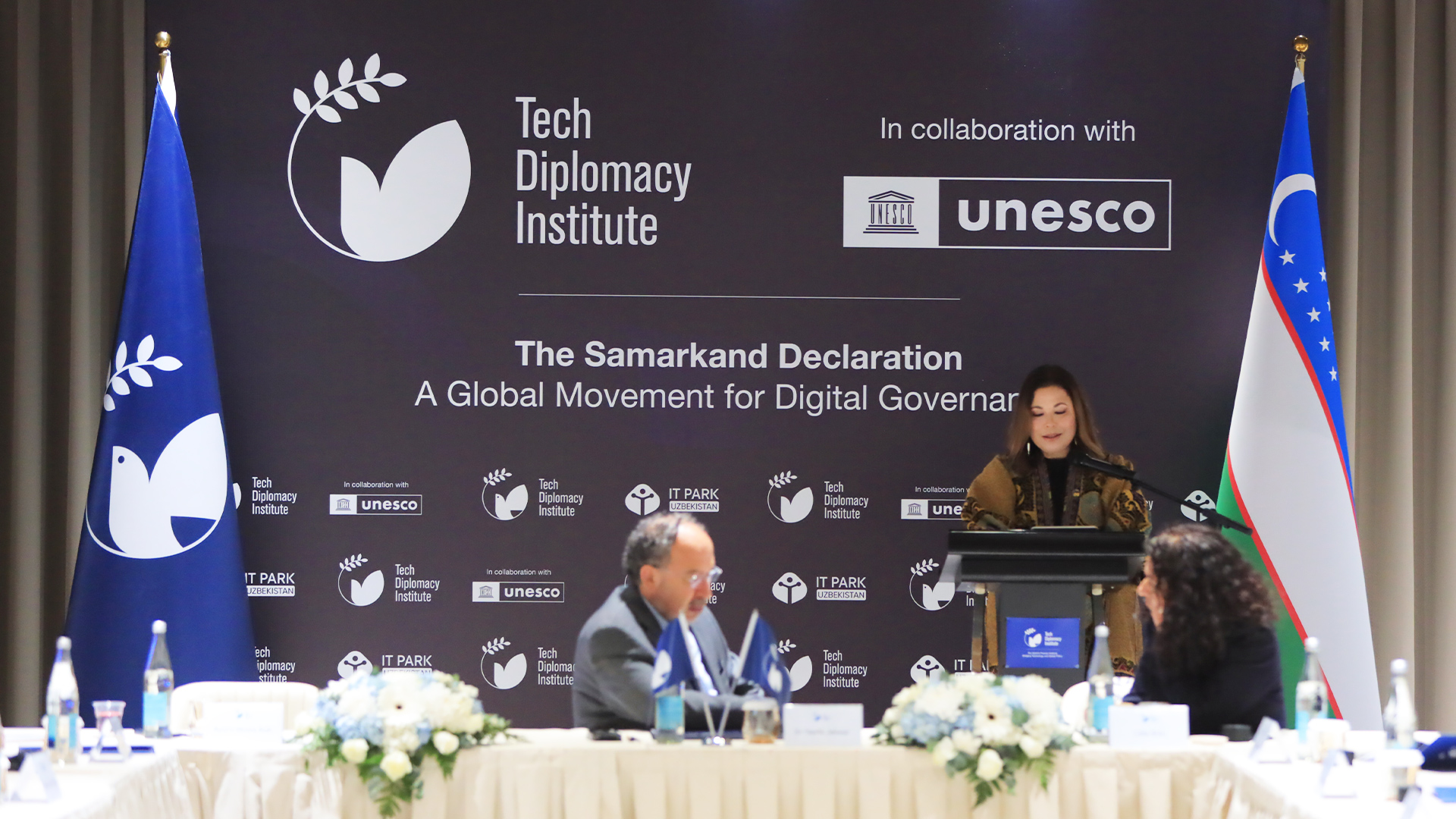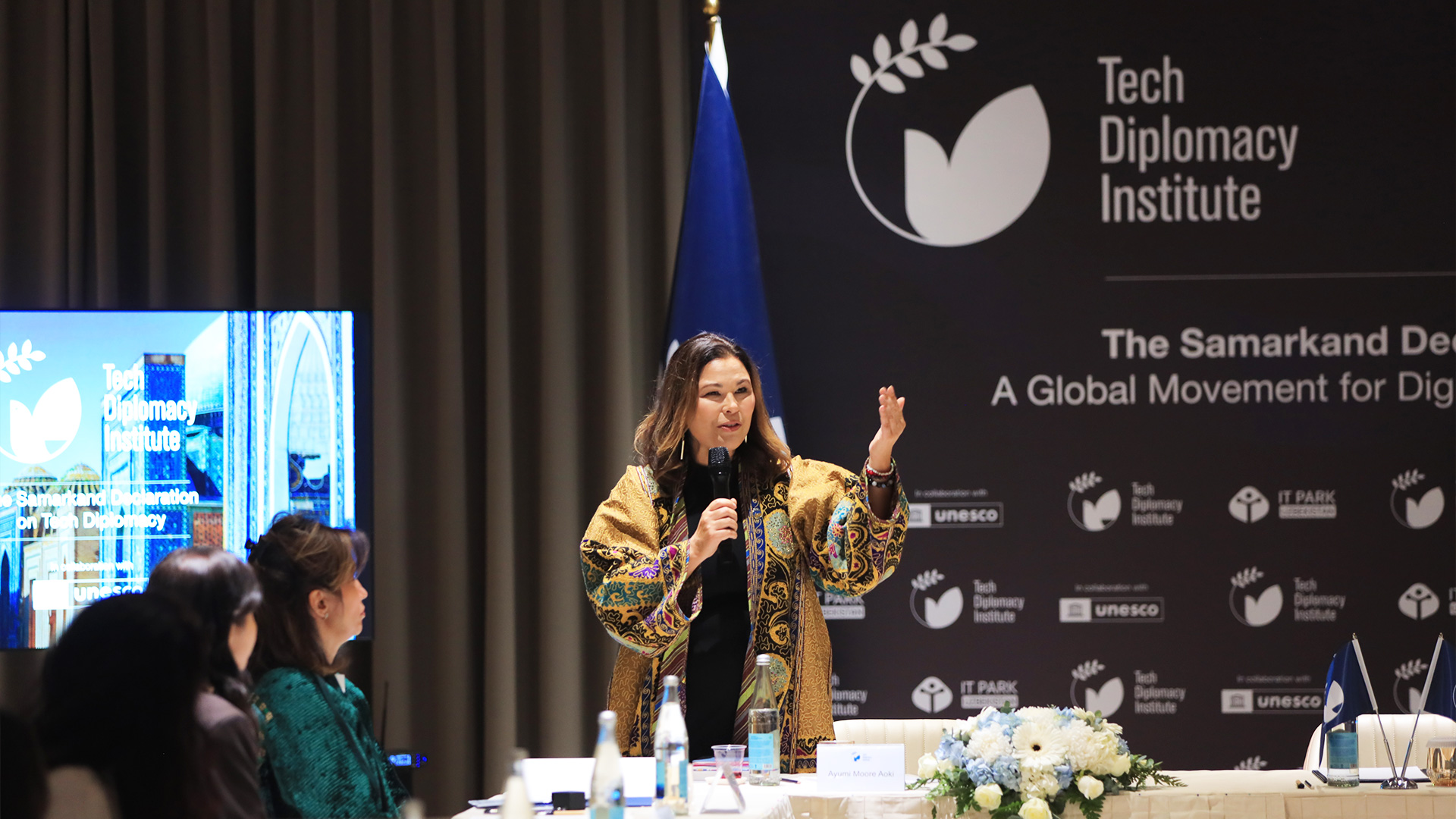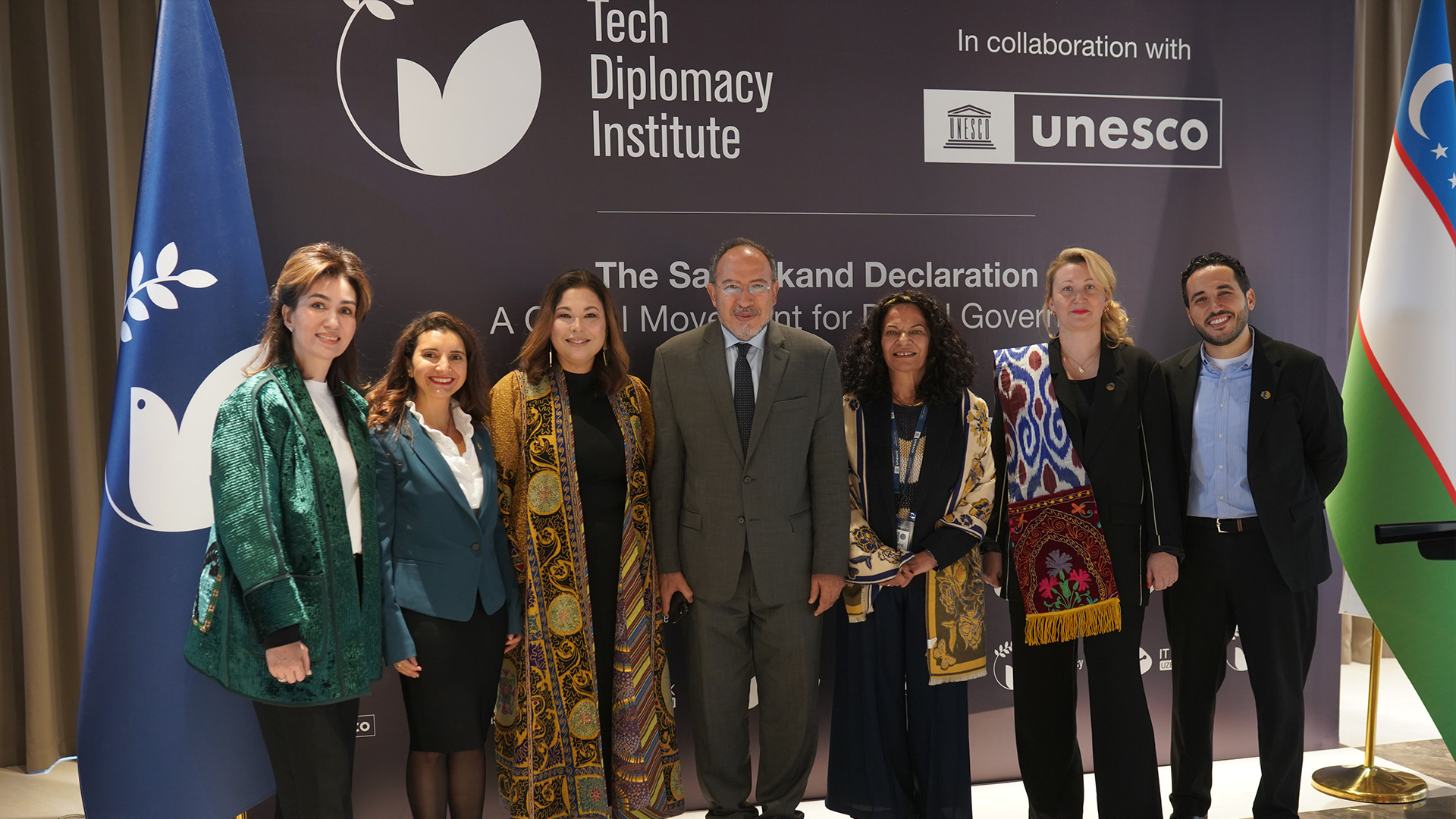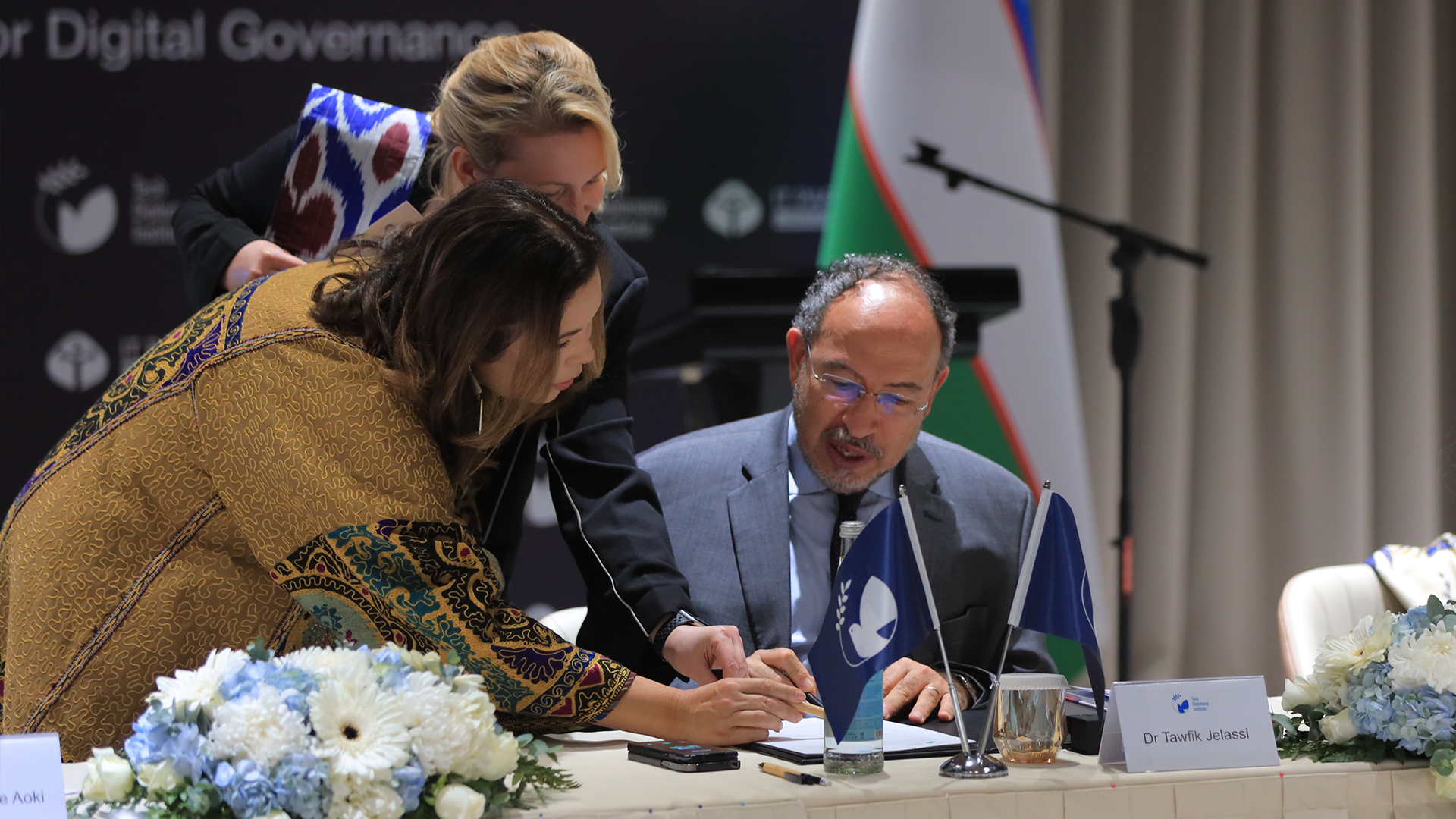
On Saturday, November 1st, world leaders gathered in Samarkand for the launch of the Samarkand Declaration on Tech Diplomacy—the world’s first global movement ensuring every nation has diplomatic capacity to shape the digital future.
Held as an official side event to UNESCO’s 43rd General Conference—the first outside Paris since 1985—this historic ceremony marks the beginning of an international process that will bring the Declaration to every region by 2027 and achieve universal adoption by 2030.
A Critical Gap in Global Governance
The timing of this initiative reflects an urgent reality: more than 170 countries lack dedicated Tech Ambassadors, and fragmented digital regulation costs the global economy $2.8 trillion annually (Economist Impact, 2025). Technology now shapes every dimension of international relations—from artificial intelligence to cybersecurity, from data sovereignty to digital infrastructure—yet the majority of nations lack the diplomatic capacity to participate meaningfully in these critical conversations.
When 140 conflicting data protection laws, 60 distinct AI governance frameworks, and 40 cryptocurrency regulatory regimes create a compliance maze, innovation is stifled and smaller nations are systematically excluded from shaping the rules that will govern their digital futures.
The Tech Diplomacy Institute, in collaboration with UNESCO, convened governments, industry leaders, civil society, and academia from Central Asia as founding signatories and observers to address this crisis through coordinated, multilateral action.

The Samarkand Declaration: Four Core Commitments
The Samarkand Declaration is not a treaty imposing legal obligations. It is a voluntary commitment framework that empowers nations to build diplomatic capacity for the digital age.
Open to all nations regardless of political system, economic development, or existing digital infrastructure, the Declaration establishes four foundational commitments:
1. Diplomatic Representation in Technology
Signatories are encouraged to appoint Tech Ambassadors or equivalent senior diplomatic representatives dedicated to technology and innovation diplomacy.
2. Multilateral Coordination on Standards
Nations commit to contributing their perspectives, expertise, and best practices to developing global standards for AI governance, data protection, cybersecurity, and emerging technologies—with particular focus on ensuring developing countries have meaningful voice and agency.
3. Institutional Coordination Through Annual Forums
Signatories participate in the annual Global Tech Diplomacy Forum, convened by TDI in collaboration with UNESCO, to review implementation progress, address emerging challenges, coordinate multilateral responses, and build consensus on international norms.
4. Universal Accessibility
The Samarkand Declaration remains open for signature by all Nation States at any time, with no prerequisites or barriers to entry.

Action-Oriented Implementation
Founding signatories affirmed that Tech Diplomacy must be grounded in collective action and tangible outcomes through joint testbeds, pilot initiatives, and knowledge-sharing platforms that promote experimentation, learning, and measurable impact. Building public trust through results and shared achievements, rather than solely through formal agreements, was recognized as essential across domains such as AI, cybersecurity, and data privacy.
Following the signing ceremony, delegations convened for a Tech Diplomacy Roundtable to discuss national digital transformation priorities and concrete expectations for international cooperation—translating ceremonial commitments into actionable next steps.

Central Asia as the Cradle of Digital Diplomacy
The choice of Samarkand holds both symbolic and strategic significance. For 2,500 years, this city has served as a crossroads where civilizations met and scholars collaborated to advance human knowledge. Central Asia also represents one of the world’s youngest regions, where over half the population is under 30—a demographic reality that positions the region as a natural catalyst for youth-driven digital innovation and next-generation tech diplomacy.
“From the Silk Road crossroads that once connected civilizations, we are forging a digital road to our shared future,” I stated during the opening ceremony, emphasizing the historical continuity between ancient networks of cooperation and the multilateral coordination frameworks we must build today.
UNESCO Collaboration and Core Values
As Dr. Tawfik Jelassi, Chair of TDI’s Supervisory Board, emphasized: “Technology transcends borders, yet diplomacy has failed to keep pace. The Samarkand Declaration represents the inclusive cooperation our digital age demands.”
The Tech Diplomacy Institute’s work is grounded in core values—Integrity & Trustworthiness, Collective Benefit, Equity & Digital Justice, and Diversity & Inclusion—that are closely aligned with UNESCO’s Science Diplomacy Values and Principles. These commitments ensure that our platform remains neutral, that solutions advance both national sovereignty and global cooperation, and that all nations have meaningful agency regardless of size or resources.
The Road Ahead: 2025-2030
The Samarkand launch represents the first milestone in a comprehensive global strategy. TDI will organize regional signing events across all continents from 2026 to 2028, with the objective of universal adoption by 2030. The Declaration remains open to all UNESCO Member States as signatories, and to private sector and civil society actors as Supporting Partners.
Our goal is clear: By 2030, every nation—regardless of size or technological capacity—should have the diplomatic expertise to participate in global technology governance.
This is not merely aspirational. It is an operational imperative. The cost of fragmentation is unsustainable, the pace of technological change is accelerating, and the window for inclusive, coordinated governance is narrowing.
Gratitude and Acknowledgment
This initiative would not be possible without the vision and commitment of our Supervisory Board members—Dr. Tawfik Jelassi, Dr. Lidia Brito, and Prof. Gulnoza Ismailova—whose guidance ensures our institutional neutrality and excellence.
Special recognition is due to IT Park Uzbekistan, our local partner and sponsor, whose support made Samarkand the birthplace of this global movement, and to School 21 for their partnership in this historic initiative. The presence of distinguished delegations from Tajikistan and Kazakhstan demonstrated the spirit of regional cooperation essential to our mission.
From the Silk Road of the past, we are building the digital road to our shared future.
The Samarkand Declaration is available at www.tech-diplomacy.com/samarkand-declaration